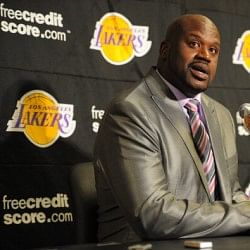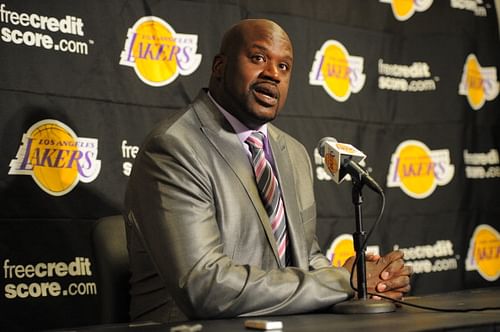
Shaq, Kobe and the Big 'IF'
“Can you dig it?” Okay, make it louder. “CAN YOU DIG IT? “
For those of you who are confused, I just wish to clarify that I am not making any bloviating references to a certain Booker T. I wish to talk about a man who is much bigger than the WWE star; bigger in every sense of the word. The words aren’t maybe as signature as maybe to a Booker T, but if you choose to open up your jersey retirement “Thank You” speech with that, I guess the phrase must be some kind of an identity.

Shaquille O’Neal showed us new dimensions in the sport of basketball and was so dominant that it made other 7-feet, 260 pound big-men look like Lilliputians going up against Goliath, let aside being David. The man was adorned by a plethora of nicknames, some of the most popular being: “The Big Aristotle and Hobo Master”,”Shaq”, “The Diesel”, “Shaq Fu”, “The Big Daddy”, “Superman”, “The Big Agave”, “The Big Cactus”, “The Big Shaqtus”, “The Big Galactus”, “Wilt Chamberneezy”, “The Big Baryshnikov”, “The Real Deal”, “The Big Shamrock”, “The Big Leprechaun”, “Shaqovic”, “The Big Conductor”. All of these nicknames may not be exuding a singular distinctive message, but the diversity as well as the incongruity is nothing but a testament to the multi-faceted and belligerent big man. The funny part is that he actually believed there was a reason behind all of them.
Some of his most pronounced reasons are: “I’d like to be known as ‘The Big Aristotle’ because Aristotle once said, Excellence is not a singular act; it’s a habit. You are what you repeatedly do. I want to be known as ‘The Big Shakespeare.’ It was Shakespeare that said, some men are born great, some achieve greatness, some have greatness thrust upon them. The ‘Big Stock Exchange.’ I start off at one price. Every now and then I’ll go down, but eventually I’ll go back up. The Big IPO. Put your money on me. Because when I go public, we all gonna make money.” Well, the histrionics are well-documented, and if his statements weren’t catchy enough, he had his own bag of tricks and gags that kept the media interested and the fans delighted. Hollywood certainly belonged to Shaq, and he belonged to Hollywood.
Yes, I know that with the retirement and the place on the legendary Lakers rafter, most people will be busy celebrating and bedizening Shaq, remembering him for everything he meant to the city during his 8 long years; the years that saw him win almost everything that there was to be won in the basketball universe. Fittingly, Jeanie Buss put it up in the best possible way: Two words, Champion and a Laker.
However, today as I sit trying to remember the Diesel, I would like to remember him for everything that could have been had he stayed a Laker for life; maybe retire as a Laker like the rest of the legendary player jerseys accompanying him on the rafters above: Wilt, Kareem, Magic, Goodrich, West, Worthy, Baylor and Wilkes. Now, I am not questioning the validity of Shaq being commemorated with all these greats, because one can’t surely agree against 3 Championships, a league MVP, 3 times NBA Finals MVP, and those gargantuan and hypnagogic numbers he posted.
But the fact that Shaq’s jersey finds a place alongside Magic creates the greatest dichotomy of it all. The Lakers fans loved Magic for everything, christened him lovingly as Mr. Laker and raved about his wizardry on the court and his personality off it. He was the league’s biggest superstar before HIV brought about a sad end to his NBA career. If Magic’s career hadn’t been cut short so early, we may have never known Jordan as we know him now. It was only when Magic gave up the baton that Jordan actually embraced stardom and scripted his immeasurable legacy.
Now, when the Lakers and Jerry West brought Shaq into the line-up, Shaq bore a similar perception within the fans. He was a monster inside, and the pleasing funny guy outside. But it is their departures from the franchise that sets them so apart. While Magic went off in the shadows silently to fight his next battle with HIV, Shaq went out just because the Lakers chose to keep their battles on the court, and find a solution to the never-ending tirade between Shaq and Kobe.

Now, I am aware that Shaq did want to stay with the Lakers and most probably finish his career with them, but he was just not ready to make the sacrifices. Was he too much of a big-dog to step aside and let somebody else have the spotlight? Well, no. Because if you were to look at his time beyond the Lakers, Shaq played the role of a side-kick as well. Be it with Wade, LeBron or the galactic Celtics Big Four, he had no issues playing the role-guy, promoting the talents of the younger and exuberant kid in Wade. This is the same guy who had dismissed Kobe saying, “I have no intentions of baby-sitting,” on joining Los Angeles and on knowing about the acquisition of a high school superstar in Bryant.
His philosophy when he came to Los Angeles was very simple and most aptly stated by the big guy himself, “I have 10 fingers, and no rings. And I love jewellery.” The loss against the Hakeem Olajuwon-led Rockets was still very much in his thought process, and he believed that he had a chance to expunge and obliterate much of that bad taste with the Lakers. Further on, a new home gave him the chance to be the undisputed alpha dog. Shaq knew that he had the potential to be as dominant as Wilt Chamberlain and was adamant that the offense should flow through him. Hardaway was just too skilled to be someone who throws the ball into the post and then spots up on the perimeter. He had too much in his game to be just a spot-up shooter and, when he differed from Shaq, it was just too much of selfish ball as per Shaq. Big men calling ball handlers ball-hoggers is not a rarity.
However, in Los Angeles, Shaq knew he was walking into a team that already had two All-Star guards in Eddie Jones and Nick Van Exel. But the calling was also about the vision to usher in a new dynasty, to match the Minneapolis Lakers of the 1950s and the Showtime Lakers of the 1980s. Kobe was very much an essential part of this jigsaw, but Shaq was supposed to be the centre-piece.
However, Shaq was not ready to have a Penny Hardaway situation. He believed he had the offensive repertoire to be the focal point of an offense, much like Moses Malone was with the Rockets, or like his idol Wilt Chamberlain was throughout his career. So, when he suddenly came up against this high school kid who believed he had it in him to be the best player in the game, and out-worked everyone else, he was sensing audacity and obnoxiousness – something that he, being the leader and the alpha guy, was just not ready to take. Now, Kobe was a loner and with his “me against the world” mentality, was by no means an ideal teammate. He was reticent, and refused to hang out and even make an effort to have any contact with his teammates. To him it was all about basketball, and it was just an alien idea for him to try and do anything with his teammates beyond the suicide drills and the practice sessions. Shaq, on the other hand, was the exuberant big brother to his teammates, throwing parties, playing pranks, sharing laughs and getting them the media attention. Naturally, the team had its favourite, and for obvious reasons, Kobe didn’t have a problem.
And this is where I, being a Kobe and a Laker fan, have a problem with Shaq. Kobe was still too young to face the hard end of the deal from a 7-foot, 300 pound guy, and considering the fact that he grew up in Italy and was new to the American big brother-little brother concept, one can only expect Shaq to do better. Kobe didn’t go to college, most of his childhood friends were from Italy, and thus when he stepped into the Lakers jersey, he was just a 17-year old kid who could play the game. A 17-year-old kid who didn’t have anything else in his life but the sport. Shaq had the opportunity and the responsibility to ease his transition into the bright spotlight – a role that he adorned to great effect with Wade and the Miami Heat.
Was Kobe wrong in many of his decisions? Yes. He wasn’t the ideal teammate despite being the insatiable work-horse in training, and was solely motivated in becoming the best player that he could be. Was he trying to be the best ally to Shaq? No, he wasn’t. But anyone who saw Kobe in his struggles can tell you that Kobe loves his game too much to sacrifice, and the only thing that matters more is winning. At every point in his career, Kobe was always ready to sacrifice when he realized that his decisions could very well be the difference between winning and losing. Shaq did call out Kobe after his 51-point game against the Warriors in 2001 because he believed that Kobe hogged the ball and refused to accept that he could be the focal point of the Lakers offense. The thing that he didn’t realize was that Kobe was angrier because he knew that the Lakers hadn’t won the game. What Shaq assumed as snobbishness was just a prodigious young kid trying to do more than necessary to win.
I am no judge and can safely vouch for both the players when they say that it was impossible for them to co-exist. In the recent past, they have shed more light on their relationship; with age and maturity, they have started to realize that the bad blood was just both of them being too headstrong rather than actually having a dislike for each other. Kobe made his speech at Shaq’s retirement, and all seemed fair and pretty.

Shaquille O’Neal greets former teammate Kobe Bryant.
But as a fan, I would just like to paint a picture of what could have been had the Kobe-Shaq relationship been simpler and far less turbulent. Shaq would have ended with a couple of more rings, a thousand or more points, a few hundred rebounds more and not spending his twilight years in the sport jumping bandwagons in search of glory; maybe even a statue after his retirement. Kobe would have never had to play the Smush Parker years, could have won more than 6 Championships, maybe would have had a couple of thousand points lesser, but would been far less beat for sure. His ability and the desire to win can never be questioned, as he has proven with his most recent performances, averaging over 46 minutes, 25 ppg and 10 apg. Imagining a Shaq in place of a Dwight with a younger Kobe is just scary.
Most importantly, the concept of a one-two punch would have met its most ideal perpetrators. It could have ushered in a new dynasty for the Lakers, maybe even better than the Magic Johnson-led Showtime Lakers. And that is the saddest part of the dichotomy of this Laker legend. Kobe will also someday have his jersey retired, and maybe Shaq will be called to say a few words. But to all of the Laker fans, it will always be about two players who could have changed the sport for good had they found a way to co-exist. If only everyone was wiser. If only the precious words weren’t saved for retirement speeches.